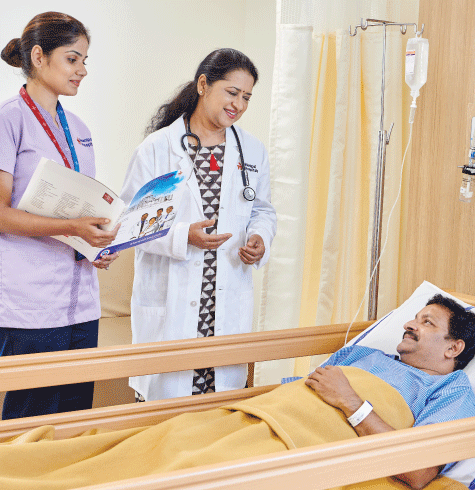-
Book Appointments & Health Checkup Packages
- Access Lab Reports
-
-
Book Appointments & Health Checkup Packages
-
Centre of
Excellence
Centre of Excellence
Other Specialities
- Anesthesiology
- Bariatric Surgery
- Cancer Care
- Dental Medicine
- Dermatology
- Ear Nose Throat
- Fetal Medicine
- Hemato Oncology
- ICU and Critical Care
- Internal Medicine
- Interventional Radiology
- IVF and Infertility
- Laboratory Medicine
- Microbiology
- Neonatology & NICU
- Nutrition And Dietetics
- Ophthalmology
- Paediatric And Child Care
- Paediatric Surgery
- Pain Medicine
- Pathology
- Pharmacy
- Physiotherapy
- Plastic, Reconstructive And Cosmetic Surgery
- Podiatric Surgery
- Psychiatry
- Pulmonology (Respiratory and Sleep Medicine)
- Radiology
- Reproductive Medicine
- Rheumatology
- Sports Medicine
- Vascular and Endovascular Surgery
Speciality Clinics
- Doctors
- Hebbal
-

Bengaluru

-

Bhubaneswar
-

Delhi - NCR

-

Delhi - NCR
-
-

Goa
-

Jaipur
-

Kolkata

-

Mangaluru
-

Mysuru
-

Patiala
-

Pune

-

Salem
-

Vijayawada
- International Patients











Treatment of polymyositis and polymyalgia rheumatica
Treatment of polymyositis and polymyalgia rheumatica in Hebbal, Bangalore
This widespread inflammatory disease affects different body parts and causes pain in the muscles with stiffness. The shoulders, neck, arms and hips are mostly affected.
-
Treatment for PMR includes the administration of a corticosteroid such as Prednisone, which effectively lowers swelling and pain. The patient has to continue the treatment for about a year with a gradual increase of the dose for the first few months. Although the stiffness and pain are relieved within the first few days of starting the treatment, the doctor will continue the treatment. Due to the possible side effects caused by the medication, a minimum dose is maintained. If the treatment is stopped, there is usually a recurrence of the symptoms. Periodical follow-up with the doctor is essential to consider any side effects and dosage. High blood pressure, weight gain, diabetes, a decrease in the density of bones gradually, etc., are some side effects that corticosteroids may cause.
-
Daily supplements of vitamin D and Calcium are given to counteract the loss of bone density experienced by the patient. Due to the corticosteroid treatment, maintaining the calcium level of the bones is extremely important. The recommended dosage level is 1000 to 1200 mg of Calcium and 600 to 800 units of Vitamin D daily for about three months. This is for those patients who take the corticosteroid treatment for a minimum of at least three months.
-
Combining Methotraxate with corticosteroid treatment effectively enhances the treatment's effectiveness. It is used to suppress the immune system and is usually taken orally. For those patients who relapse with corticosteroid treatment, Methotrexate is effective in increasing the effectiveness.
-
Physical therapy that sorts out the stiffness within the muscles is very effective.
-
Decreasing the intake of salt can help in the control of blood pressure spikes often seen in PMR.
-
Daily exercise to ease muscle pain is the best home remedy for the illness. Bone strengthening exercises that may be performed after consulting a doctor are ideal ways to deal with the disease. The weight can be managed well with these exercises whilst curbing the pain associated with the body's different muscle groups.
-
Taking adequate rest every day and not being physically stressed out is essential for coping with the disease. Rest helps lower stress on the body's muscles and bones.
-
Using assistive gadgets such as a walking stick or grabbing onto side railings effectively relieves any pain in the body. Using a shopping trolley and other assistive devices helps to manage when performing daily chores.
Gout Treatment methods
This is a type of arthritis that is caused by the accumulation of uric acid in the body. Although typically seen to affect the toes, it is also seen in the body's other joints, such as the wrist, knees, ankles, etc. There are two approaches to treating gout, pharmacological and non-pharmacological methods. The pharmacological methods of Polymyositis and polymyalgia rheumatica treatment in Hebbal, Bangalore include the medications listed below,
-
NSAIDs.
-
Corticosteroids.
-
Colchicine.
-
Cortisone.
-
Interleukin-1 antagonists.
Non-pharmacological management of gout
-
Drinking lots of water for optimal kidney functioning.
-
Maintaining a healthy weight with daily exercise.
-
Decreasing foods high in purine levels like shellfish, alcohol, red meats, liver, fruit fructose, animal proteins, etc.
-
Consuming vegetarian-based proteins.
-
Avoiding sodas and other sweetened drinks.
Book an appointment at Manipal Hospitals now to know more about treatment.
Home Hebbal Specialities Rheumatology Treatment-of-polymyositis-and-polymyalgia-rheumatica





